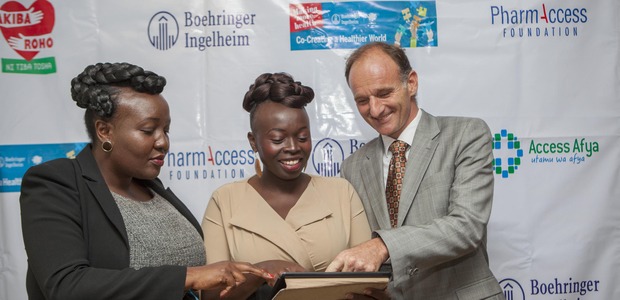advertisement
PharmAccess Foundation, three companies launch healthcare program to assist low income communities
(Left to right) Pharm Access country director Millicent Olulo, Access Afya Chief of Staff Maggie Kiplagat, and Boehringer Ingelheim head…

A press conference was held to commemorate the launch of a program which targets low income communities to assist them to save money for their future healthcare needs especially for non-communicable diseases (NCDs) and helping to drive and raise awareness around the prevalence of NCDs in partnership with Boehringer Ingelheim, Access Afya, Ashoka, and PharmAccess Foundation.
Akiba ya Roho, a new non-communicable disease management program that includes a mobile health savings wallet solution was developed to encourage healthcare inclusion and awareness.
It is a medical service delivery concept for NCDs that runs on a mobile platform. The concept allows people to save money for healthcare to encourage adherence to treatment and to change patients’ health seeking behaviours. The money saved in the mobile wallet can be used at Access Afya clinics for management and control of the patients’ conditions.
advertisement
Dr. Eduardo Lioy, representative of Boehringer Ingelheim who has worked as an Executive in Residence in Kenya for the Program development said, “Most Kenyans do not have access to adequate basic healthcare for themselves or their families. They either rely on public services, which are often overstretched, or on private healthcare, which may not be affordable. At the same time, the unprecedented rise in mobile phone usage represents a strong opportunity to make healthcare more accessible through the digitalization of healthcare services via mobile phone connectivity.”
Boehringer Ingelheim will fund vouchers that cover 100% of the cost of the initial screening as well as incentives that go towards reducing the cost of the next clinic visit, which patients can use across Access Afya clinics. Moreover, for every follow up visit, Boehringer Ingelheim will further incentivize the next visit up to 40% of the cost of a visit at Access Afya.
“This new innovative platform helps connect patients with the right healthcare services and ensures that they can receive affordable healthcare in Kenya, with the encouragement of adhering to treatments and changing patients’ health seeking behaviours,” he added.
advertisement
As part of the launch event, patients will be screened for diabetes and hypertension, free of charge, in mobile clinics and through the Access Afya network with an objective to register them into the micro saving plans via the mobile health wallet. The program aims at screening 10,000 patients via its network of micro clinics. Access Afya was selected to run this program because of the network of clinics is low-cost through use of systems, rapid/digital diagnostics, and lean processes as well as having stronger disease management protocols and quality assurance. Clinics are sustainable and the network is growing, providing scale opportunities for the program.
Margaret Kiplagat, Chief of Staff at Access Afya noted, “We are pleased with the rollout of this important program which complements our overall approach in delivering cost effective and convenient primary health underpinned by strong technology systems. Akiba ya Roho is an extension of our strategy to create a model for comprehensive primary care for the global mass market: people that earn $2-5 per day.”
Millicent Olulo, Country Director at PharmAccess Foundation said “We believe that mobile health has the potential to revolutionize healthcare delivery. We are pleased with the rollout of this new initiative that aims at helping people across low income communities take control of their health. The micro-savings wallet encourages patients to adhere to treatments and follow-ups. This product provides the technical platform to allow individuals to send, save and spend funds for medical treatment and savings management, in an effort to ensure long-term health benefits while also offering screening and management of NCDs. When successful, we hope to scale it for all patients that currently use M-TIBA.”